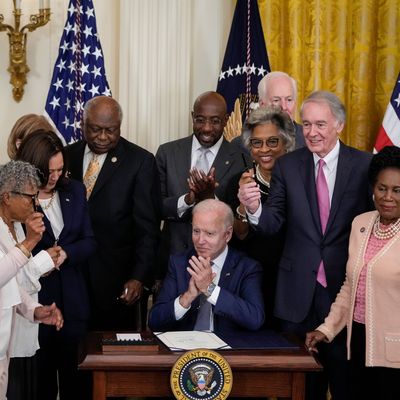
Acting with unexpected speed, Congress passed legislation this week to make Juneteenth (June 19), the date associated with the end of slavery, a federal holiday. The Senate approved the bill on Tuesday and it overwhelmingly passed the House the next night. President Biden signed it into law on Thursday afternoon.
“Great nations don’t ignore their most painful moments,” Biden said at the White House signing ceremony. “They don’t ignore those moments in the past. They embrace them. Great nations don’t walk away. We come to terms with the mistakes we made.”
The breakthrough occurred earlier this week when everyone seemed to expect that Republican Wisconsin senator Ron Johnson would object to a unanimous consent motion to enact a bill making the change, as he did last year (complaining of the cost of a new federal holiday). But he didn’t, as the Milwaukee Journal-Sentinel reported:
“While it still seems strange that having taxpayers provide federal employees paid time off is now required to celebrate the end of slavery, it is clear that there is no appetite in Congress to further discuss the matter. Therefore, I do not intend to object,” Johnson said in a statement Tuesday.
So the Senate cleared the resolution without objection, and the House hastily took it up. After an abbreviated debate, and with long-time Juneteenth champion Sheila Jackson Lee of Texas in the chair, the House passed the legislation by a 415-14 margin, and sent it to Biden. The law went into effect immediately, with most federal employees getting Friday off, per the Office of Personnel Management.
The 14 Republicans voting “nay” were Andy Biggs and Paul Gosar of Arizona; Mo Brooks and Mike Rogers of Alabama; Andrew Clyde of Georgia; Scott Desjarlais of Tennessee; Doug LaMalfa and Tom McClintock of California; Thomas Massie of Kentucky; Ronnie Jackson and Chip Roy of Texas; Ralph Norman of South Carolina; Matt Rosendale of Montana and Tom Tiffany of Wisconsin.
Rosendale went out of his way to offensively explain his vote against the commemoration of slavery’s end:
Last-minute insults aside, the effort to make Juneteenth a holiday achieved success more quickly than the earlier drive for a Martin Luther King Jr. holiday, which succeeded in 1983. Juneteenth definitely benefited from the racial justice protests of 2020, and the renewed interest in the history of U.S. racism, conservative protests notwithstanding. Forty-seven states have some sort of Juneteenth commemoration, but only Texas has made it a paid holiday for public employees. You can expect that number to rise now that Washington has acted.
This post was updated after Biden signed the bill into law.






























